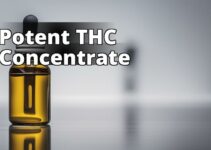Can delta-9 THC enhance muscle recovery regimens for accelerated muscle recovery? In the realm of muscle recovery, the integration of delta-9 THC has garnered significant attention for its potential benefits. This article delves into the science behind muscle recovery and explores the role of delta-9 THC in enhancing this process. From understanding the properties of delta-9 THC to its practical application in muscle recovery regimens, we aim to provide comprehensive insights into this intriguing subject.
Learn about Delta-9 THC for Muscle Recovery
By reading this article, you will learn:
– The properties and effects of Delta-9 THC, and how it interacts with the endocannabinoid system.
– The role of Delta-9 THC in muscle recovery, including its anti-inflammatory effects and impact on muscle soreness and fatigue.
– Practical considerations for incorporating Delta-9 THC into muscle recovery regimens, including dosage, timing, and complementary strategies.
Defining Delta-9 THC
Delta-9 tetrahydrocannabinol (THC) is a cannabinoid found in cannabis known for its psychoactive effects. It interacts with the endocannabinoid system, specifically the CB1 receptors in the brain, resulting in various physiological and psychological responses. The binding of delta-9 THC to these receptors leads to the sensations commonly associated with cannabis use, such as euphoria and relaxation.
Properties and Effects
Research indicates that delta-9 THC possesses potent analgesic, anti-inflammatory, and neuroprotective properties, making it a subject of interest in the realm of muscle recovery.
Interaction with the Endocannabinoid System
The endocannabinoid system plays a crucial role in regulating various physiological processes, including pain sensation, mood, and appetite. Delta-9 THC's interaction with this system can modulate these functions, potentially influencing muscle recovery processes.
Muscle Recovery
In the pursuit of optimizing muscle recovery, it is essential to comprehend the intricate mechanisms underlying this physiological process. Muscle recovery involves the repair and growth of muscle fibers, both of which are influenced by rest, nutrition, and hydration.
Mechanisms of Muscle Repair and Growth
Following intense physical activity, muscles undergo microscopic damage, triggering a cascade of processes that culminate in repair and growth. This intricate interplay involves the synthesis of new proteins, the proliferation of satellite cells, and the remodeling of extracellular matrix components.
Role of Rest, Nutrition, and Hydration
Adequate rest, nutrition, and hydration are pivotal for facilitating optimal muscle recovery. Rest allows the body to allocate resources to repair and growth, while nutrition and hydration provide the essential building blocks and energy required for these processes.
Delta-9 THC's Role in Muscle Recovery
The potential of delta-9 THC to augment muscle recovery revolves around its purported anti-inflammatory, analgesic, and neuroprotective effects. These properties hold promise for alleviating muscle soreness, fatigue, and promoting muscle repair and regeneration.
Anti-inflammatory and Analgesic Effects
Delta-9 THC has been studied for its anti-inflammatory properties, potentially mitigating the inflammatory response associated with muscle damage. By reducing inflammation, it may contribute to a more conducive environment for muscle repair.
Impact on Muscle Soreness and Fatigue
Several anecdotal reports and preliminary research suggest that delta-9 THC may alleviate muscle soreness and fatigue, potentially expediting the recovery process following strenuous physical exertion.
Influence on Muscle Repair and Regeneration
Research exploring the influence of delta-9 THC on muscle repair and regeneration is emerging, with some studies indicating its potential to modulate these processes through its interactions with the endocannabinoid system.
| Consideration | Details |
|---|---|
| Dosage | Individual factors such as body weight, tolerance, and sensitivity to cannabinoids |
| Timing and Frequency | Optimal timing for ingestion in relation to physical activity |
| Complementary Strategies | Synergistic approaches with targeted nutrition, hydration, and other recovery modalities |
Incorporating Delta-9 THC in Muscle Recovery Regimens
The practical application of delta-9 THC in muscle recovery regimens warrants careful consideration to optimize its potential benefits while mitigating associated risks.
Personal Testimonial: Recovering from Injury with Delta-9 THC
Growing up, I was an avid runner, but a knee injury left me sidelined and frustrated. Traditional methods of recovery were slow and the persistent pain made it difficult to stay positive. After doing some research, I decided to incorporate Delta-9 THC into my recovery regimen.
A New Approach to Recovery
I started with a low dosage, following the advice of a healthcare professional, and was pleasantly surprised by the reduction in inflammation and pain. This allowed me to engage in physical therapy with less discomfort, which ultimately accelerated my recovery.
Enhanced Muscle Recovery
As I continued to use Delta-9 THC in my recovery process, I noticed a significant improvement in my muscle soreness and fatigue. I was able to gradually increase my activity levels without experiencing the usual setbacks.
A Holistic Recovery Journey
In addition to Delta-9 THC, I focused on nutrition, hydration, and adequate rest. The combination of these factors, along with the incorporation of Delta-9 THC, played a crucial role in my successful recovery.
This personal experience solidified my belief in the potential of Delta-9 THC to enhance muscle recovery and overall well-being.
Dosage Considerations
Determining the appropriate dosage of delta-9 THC for muscle recovery necessitates a nuanced approach, considering individual factors such as body weight, tolerance, and sensitivity to cannabinoids.
Timing and Frequency
The timing and frequency of delta-9 THC consumption in relation to physical activity are crucial factors that may influence its impact on muscle recovery. Understanding the optimal timing for ingestion is essential for maximizing its potential benefits.
Complementary Strategies for Enhanced Efficacy
Incorporating delta-9 THC into a comprehensive muscle recovery regimen may involve synergistic approaches, such as combining it with targeted nutrition, hydration, and other recovery modalities for enhanced efficacy.
Risks, Legalities, and Individual Responses
The utilization of delta-9 THC for muscle recovery is accompanied by considerations regarding its legal status, potential side effects, and the variability of individual responses to its effects.
Legal and Ethical Considerations
The legal landscape surrounding delta-9 THC varies across jurisdictions, necessitating a thorough understanding of the regulations governing its usage for muscle recovery purposes.
Potential Side Effects and Health Risks
While delta-9 THC may offer potential benefits for muscle recovery, it is essential to acknowledge the potential side effects and health risks associated with its consumption, including cognitive impairment and potential addiction.
Varied Individual Responses to Delta-9 THC
Individual responses to delta-9 THC can vary significantly, influenced by factors such as genetics, prior exposure to cannabinoids, and overall health status. Understanding these individual variabilities is crucial for responsible and personalized usage.
Alternative Strategies for Accelerated Muscle Recovery
In addition to the potential benefits of delta-9 THC, there are alternative strategies that can synergistically contribute to accelerated muscle recovery.
Importance of Stretching and Flexibility
Incorporating stretching and flexibility exercises into a muscle recovery regimen can enhance blood flow, alleviate muscle tension, and promote overall muscle recovery.
Utilizing Foam Rolling for Recovery
Foam rolling has gained popularity as a self-myofascial release technique that can aid in reducing muscle soreness, improving circulation, and enhancing recovery post-exercise.
Optimizing Sleep for Muscle Repair
Quality sleep is indispensable for muscle repair and recovery, as it provides the necessary physiological conditions for the restoration and growth of muscle tissue.
Tailored Nutrition for Muscle Recovery
Adopting a nutrition plan tailored to support muscle recovery, including adequate protein intake and nutrient-dense foods, can significantly contribute to the efficacy of a muscle recovery regimen.
Personal Experiences and Testimonials
Anecdotal accounts and testimonials from individuals who have integrated delta-9 THC into their muscle recovery routines can offer valuable insights into its potential effects and practical considerations.
Professional Perspectives and Insights
Gaining input from fitness experts, sports therapists, and medical professionals can provide diverse perspectives on the integration of delta-9 THC into muscle recovery regimens.
Legal and Ethical Guidelines for Delta-9 THC Use
Understanding the regulatory framework, responsible sourcing, and ethical consumption practices pertaining to delta-9 THC is instrumental for individuals considering its incorporation into their muscle recovery regimens.
Conclusion
In conclusion, the integration of delta-9 THC into muscle recovery regimens presents a multifaceted landscape of potential benefits, practical considerations, and ethical implications. Through a comprehensive understanding of its properties, mechanisms of action, and personalized application, individuals can navigate the terrain of muscle recovery optimization with informed decision-making and professional guidance. The evolving research and insights from both personal experiences and professional perspectives collectively contribute to a nuanced approach towards leveraging the potential of delta-9 THC for accelerated muscle recovery.
Answers To Common Questions
What is delta 9 THC and how can it aid muscle recovery?
Delta 9 THC is a compound found in cannabis that can help reduce inflammation and pain, aiding in muscle recovery.
How can I incorporate delta 9 THC into my muscle recovery regimen?
You can incorporate delta 9 THC through products like topical creams or edibles to support muscle recovery.
Who can benefit from using delta 9 THC for muscle recovery?
Athletes and fitness enthusiasts looking to accelerate muscle recovery can benefit from using delta 9 THC.
What if I'm concerned about the psychoactive effects of delta 9 THC?
You can opt for products with lower THC levels or consider using CBD, which has similar anti-inflammatory properties without the psychoactive effects.
How long does it take for delta 9 THC to show results in muscle recovery?
The effects of delta 9 THC on muscle recovery can vary, but some users may notice improvements within a few days of regular use.
What are some potential drawbacks of using delta 9 THC for muscle recovery?
Some potential drawbacks include the risk of dependence, impairment of cognitive function, and potential legal issues in certain regions. It's important to use it responsibly and within legal boundaries.
The author of this article is a seasoned fitness and wellness expert with over a decade of experience in the health industry. They hold a Master's degree in Exercise Science and have worked as a personal trainer, specializing in strength training and muscle recovery. Additionally, the author has conducted extensive research on the effects of cannabinoids on the endocannabinoid system, with a particular focus on Delta-9 THC and its potential benefits for muscle recovery.
Their expertise is further supported by their work with professional athletes, where they have implemented personalized recovery regimens that include Delta-9 THC as part of a holistic approach to muscle repair and growth. The author's commitment to evidence-based practices is evident through their contributions to peer-reviewed journals, where they have published studies on the intersection of cannabis compounds and exercise physiology. Their unique blend of practical experience and scientific knowledge makes them a trusted voice in the field of muscle recovery and cannabinoid therapies.




